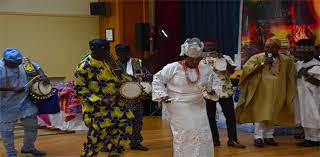Worldwide, the entertainment industry is rich with award-winning musicians, actors, comedians, skit makers, among others, who are expected to project the good image of their countries to the outside world. However, with the penchant of Nollywood stars to dwell on ritual killings, cyber-crimes and get-rich-quick epics, PAUL OKAH in this report wonders if the entertainers are projecting Nigeria’s culture, values in a positive light.
Videos of Nigerian skit makers like Sirbalo, De General, Nedu Wazobia, Brain Jotter, Syd Iwundua, among others readily pop up on Facebook with women exposing their bodies in revealing dresses and engaging in make-believe sex and debauchery for the pleasure of thousands of followers always demanding for more in the comment section.
Even the Nollywood industry seems to have implanted in the minds of Nigerians that hard work does not pay as many movies always dwell on actors getting rich after performing money rituals, cybercrimes and other fraudulent activities, sometimes after failing in different endeavours, especially in village settings.
Furthermore, with notable musicians always dwelling on heavy drinking, smoking, sex and other vices in their lyrics, it is little wonder that many Nigerians, especially the older generation, shudder at what the entertainment industry is turning out to be, as opposed to what they were in the past, when decency was sacred.
Compounded with the open display of immorality, the major concern of many Nigerians is how entertainers project the image of the country to the outside world as many things projected by those in the entertainment industry are not acceptable in any culture or tradition of Nigerian communities.
Entertainers failing Nigerians
Speaking with this reporter, a civil servant, Mrs. Anita Ogochukwu, said those in the entertainment industry are projecting a true reflection of growing immorality among youths.
She said: “I cannot say that those in the entertainment industry are projecting Nigeria in a positive light. For what it is worth, they are just trying their best to promote immorality and project the country in a bad light. Take for instance the rampant issue of everyone going into skit making on social media. Today, it is as if everyone is now a comedian. You will hardly scroll past posts on Instagram or Facebook without seeing girls baring it all and leaving nothing to the imagination.
“The truth is that many of us are failing as parents in inculcating moral values in our children. That is why you will see people leaving the house dressed anyhow and skit makers using irresponsible ladies in their videos, who wear practically nothing and leaving everything to the imagination. The people living outside the country and seeing the things we are posting on social media with the impression that they are what are obtainable in Nigeria, regardless of the fact that the supposed comedians are using them for entertainment.”
Nudity
On his part, an ICT consultant, Yahaya Sule, said it is not in the culture of Nigerians to expose their bodies in the name of entertainment for people.
He said: “It’s a pity that we’re losing our moral values in the name of entertainment. This is not obtainable in Islam. Women are commanded by Allah to preserve their bodies for their husbands; which is why you don’t see true Muslims dressing anyhow, even if they are in the entertainment industry.
“Of a truth, the entertainment industry has contributed a lot to the development of Nigeria’s culture and tourism and projecting the image of the country in a positive light. However, nudity is the order of the day amongst the present day entertainers. It appears everyone is in haste to demean women with graphic images always being painted. I wish there will be censorship of contents being posted on social media, at least to save what is left of our image.”
A blogger’s take
Speaking with Blueprint Weekend, a blogger, Nwoba Chika Nwoba, said without musicians, movie makers, comedians, skit makers and others, the image of Nigeria in the outside world would have been destroyed.
“Without our musicians, movie makers, comedians, footballers, academics, creative writers and skit makers, I don’t know what could have become of the image of Nigeria in the outside world. Other countries in Africa are jealous of Nigeria as regards these. They see Nigeria artistes, writers as having conquered the worlds of comedy, skit making, music, movie, creative arts and others in Africa. And that’s the truth.
“Our governments aren’t fair to these ladies and gentlemen that have used their skills to give the country a coveted external image. No entertainment trust fund. No encouragement whatsoever. No trust fund to advance the drive to place the country on the front burner of global visibility. What our abundant oil, solid minerals and politics couldn’t achieve for us, talents have achieved. God punished Nigeria with politics and politicians,” he said.
Bright future
Writing on his Facebook piece, Saturday Breakfast, on December 23, an entertainment writer, Tony Okoroji, said the entertainment industry in Nigeria has come a long way in projecting Nigeria’s culture and values in a positive light and that more will come.
He said: “For decades, Nigerian artistes and creative people remained at the periphery of national discourse. Nigerians may have sung our songs with passion, watched our movies with glee or read our books into the middle of the night. They still did not quite have much respect for us or what we do. Fela may have been the most recognized Nigerian face in the world, but many at home simply saw him as an irritant. But please, show me one truly successful nation on earth which has not created a special place for its creative geniuses.
“For a long time, Nigerian artists paid people at radio stations to have their music played so that the owners of the radio stations could attract listenership and make money from advertising. Many of our artistes entertained in hotels with rooms they could never sleep in and restaurants they could never dine in. If Wole Soyinka had not been given a big international prize by a Norwegian organization in faraway Oslo, many in our country would have brushed him aside as just an old rascal with overgrown grey hair!
“I have seen some musicians laugh, cry and dismayed! They never believed that they would see the day that the music industry in Nigeria would put over two hundred million naira on the table and share it among its people. They never thought that someday they would watch a movie or sing and dance in a structure like the COSON House, a magnificent building that belongs to them. We have only scratched the surface because so much more is possible.”
Ministry’s roadmap
In November, during a maiden Creative Economy Roundtable at the State House, Abuja, the Minister of Art, Culture and Creative Economy, Hannatu Musa Musawa, unveiled a roadmap to drive the country’s culture and showcase its creators to the world, while establishing the country as the leading global hub for arts, culture and creativity.
Musawa said the vision of the ministry rests on intellectual property reforms, cultural planning, revealing that Nigeria’s cultural influence will transcend borders as a brand that will also unite Nigerians across all initiatives.
She said: “The creative industries are the heartbeat of the new economy, serving as an engine of economic growth, a catalyst of change and a generator of employment opportunities. We are uniquely positioned in this great nation, endowed with an abundance of human capital and boundless possibilities.
“Our collective aim is singular, and it is bold: to position Nigeria as the world’s culture, creativity and entertainment capital.
“We have created a brand that will unite us across all initiatives as both our overall strategic direction and our soft power initiative. Destination 2030, Nigeria Everywhere will promote our culture and showcase our creators to the world, establishing Nigeria as the leading global hub for arts, culture, and creativity.”
Shettima’s applause
Also speaking at the Roundtable, the vice-president, Senator Kashim Shettima, reiterated the federal government’s resolve to empower the nation’s best talents, and harness the unconstrained potentials within the country’s diverse cultural tapestry.
He acknowledged that the creative and entertainment sector had in the past remained neglected, while thanking the industry’s stakeholders and key players for their huge contributions to the nation’s creative economy.
“This round-table is an avenue for us to deliberate and recommit ourselves to fostering an environment that nurtures creativity, innovation, and inclusivity. More than ever, we see the need to amplify the voices of our creative minds, empower our best talents, and harness the unbridled potential that lies within the folds of Nigeria’s diverse cultural tapestry.
“I want to express our gratitude for the illumination they have cast upon the world, the delight they have infused into it, and, undoubtedly, the economic prosperity and employment they have brought to the thriving galaxy of their profession,” he said.




